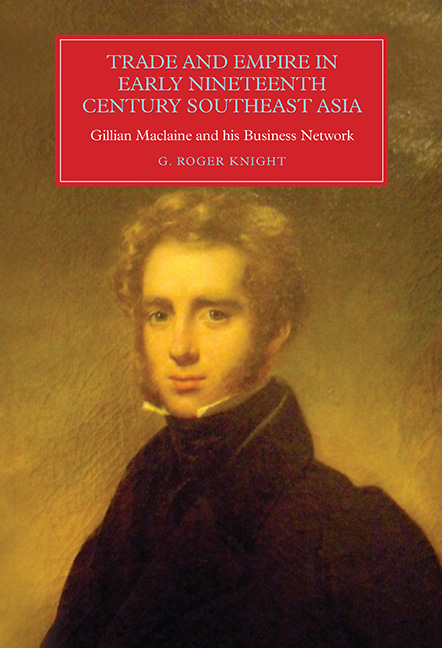 Trade and Empire in Early Nineteenth-Century Southeast Asia
Trade and Empire in Early Nineteenth-Century Southeast Asia Published online by Cambridge University Press: 17 June 2021
This is really a strange world and I little thought when I left England of settling in Java, much less of ever being a Coffee Planter or a tenant of the Emperor of Solo. A Scotch Adventurer however must pay his account to many vicissitudes in life.
It is improbable nonetheless that Maclaine could have anticipated what was actually in store for him. Between 1820 and 1827 he first dallied with the idea of setting up as a merchant in Batavia and then established himself as a deeply impecunious coffee-planter in the mountains of central Java. Subsequent to that, his investment there was placed in jeopardy by the hostility of the Indies government and threatened with destruction in a major colonial war. Moreover, as if that were not enough, he had to contend with commercial hazards that had to do, among other things, with a very significant curtailment of the import of British cottons into Java, with the rapacity of his overseas partners and with the spectacular default of a key associate on Java itself.
Maclaine arrived in Batavia in July 1820 aboard the ship Mary Anne, together (as we have just seen) with a cargo of cotton piece goods dispatched by the East India house for whom he had been working in London. Founded in its colonial form by the VOC early in the seventeenth century, Batavia was at one time an essentially Chinese city flying a Dutch flag. When Maclaine arrived there, it had long ceased to be that, but was still a city with a large and commercially dominant Indies-Chinese (in modern parlance, Chinese- Indonesian) minority made up both of recent arrivals and of families who had been long settled there. It was merchants from this group of Batavia's ethnically and culturally very mixed population with whom most of the recently arrived Maclaine's business dealings took place. Maclaine also found himself, however, among a small community of European merchants, the majority of them British – a legacy (as we have seen in an earlier chapter) of the British occupation of the island from 1811 until 1816 by East India Company forces during the later stages of the Napoleonic Wars.
To save this book to your Kindle, first ensure [email protected] is added to your Approved Personal Document E-mail List under your Personal Document Settings on the Manage Your Content and Devices page of your Amazon account. Then enter the ‘name’ part of your Kindle email address below. Find out more about saving to your Kindle.
Note you can select to save to either the @free.kindle.com or @kindle.com variations. ‘@free.kindle.com’ emails are free but can only be saved to your device when it is connected to wi-fi. ‘@kindle.com’ emails can be delivered even when you are not connected to wi-fi, but note that service fees apply.
Find out more about the Kindle Personal Document Service.
To save content items to your account, please confirm that you agree to abide by our usage policies. If this is the first time you use this feature, you will be asked to authorise Cambridge Core to connect with your account. Find out more about saving content to Dropbox.
To save content items to your account, please confirm that you agree to abide by our usage policies. If this is the first time you use this feature, you will be asked to authorise Cambridge Core to connect with your account. Find out more about saving content to Google Drive.